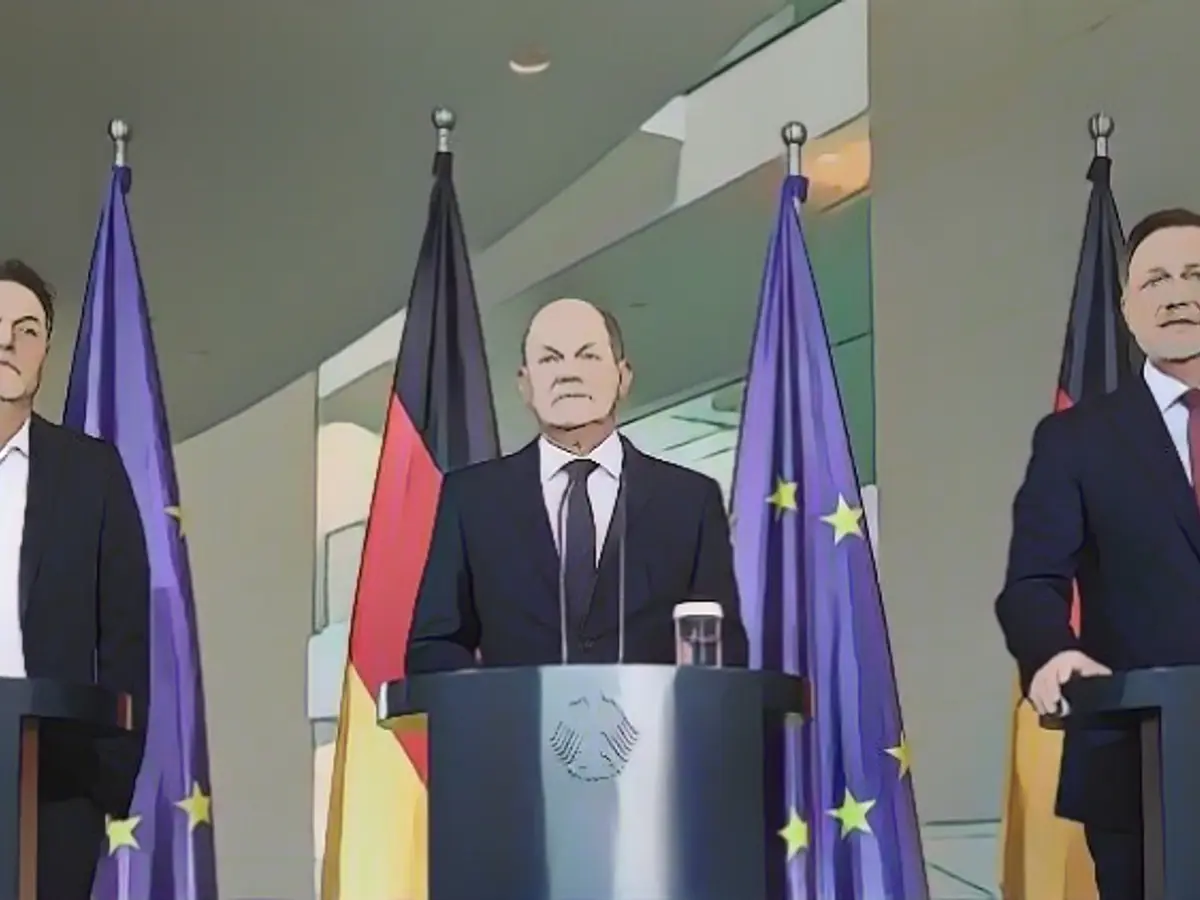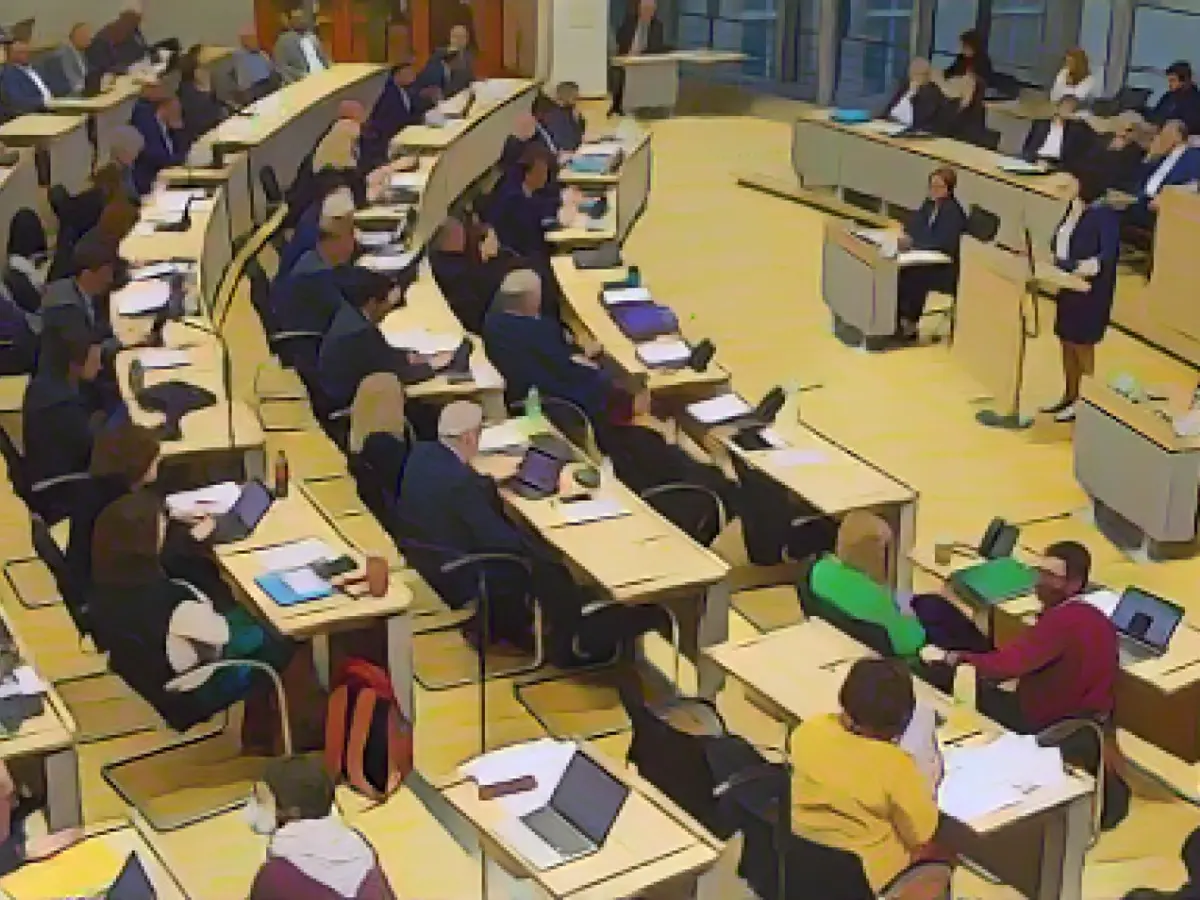The Windy Budget Crisis in Germany's Rainbow Coalition
This week, Olaf Scholz, the German Chancellor, is set to address the budget crisis in the Bundestag. However, he won't be presenting a solution. The traffic light coalition is still a distance away from reaching a consensus, and a substantial clash is looming between the SPD and Greens on one side and the FDP on the other.
Ever since the Federal Constitutional Court's damning verdict on adhering to the debt brake, the traffic light government has been bereft of a contingency plan. Over the past two weeks, they've struggled to identify a solution for the 60 billion euros now missing from the Climate and Transformation Fund (KTF) for climate projects and economic investments. Each of the following two years will see a shortfall of 15 to 20 billion euros.
Following the court's ruling last Friday, the Federal Government managed to clarify the Economic Stabilization Fund (WSF)'s handling. The fund, which finances electricity and gas price brakes, among other things, is also reportedly unconstitutional, according to the judgment. In light of this, Federal Finance Minister Christian Lindner has decided to close the WSF and dissolve it at year's end. The WSF's assets stem from loans taken out in 2022 to cushion the consequences of the gas price crisis in connection with Russia's invasion of Ukraine.
Germany's Government Hits a Split Over Energy Price Brakes
Now that the German Government intends to declare an emergency situation in a supplementary budget for the current year, which will make its way to the Bundestag this week, it plans to issue new loans to finance the 2023 electricity and gas price brake expenditure. This stems from the ruling that any loans taken out, excluding the debt brake, must be utilized in the same year. Lindner then plans to let the aid for the electricity and gas price brakes expire within a year, given the fall in electricity and gas prices. However, this is not without contention, with the SPD General Secretary Kevin Kühnert and the Green Party Chairperson Ricarda Lang expressing reservations, as the coalition had hoped to reserve the aid as an instrument until March 2024.
The dispute regarding the continuation of the energy price brake in Germany raises questions about how the traffic light coalition intends to finance KTF projects for 2024 and 2025. To compensate for the missing Climate and Transformation Fund billions, the SPD is advocating for declaring an emergency situation in the coming year, and potentially the year after that, using new loans to replenish the KTF for each respective year. Lindner asserts that the justification for the emergency situation from 2022 also applies for 2023 but will no longer be valid due to the decline in energy prices, a position that thwarts the SPD and Greens' request for the provision of aid until March 2024.
Parties on the rise and the states' concern
The FDP, while not indifferent to the jobs saved by the KTF projects, relies on more substantial conviction to argue for financing all projects from the regular budget, without any additional borrowing. The SPD and FDP are adamant that tax increases and a revision of the debt brake in the coming year are not viable options. As with the concept of a special climate protection fund, any amendment to the debt brake requires the approval of the CDU/CSU, further complicating matters for the traffic light coalition.
The coalition has only a few weeks left to institute the 2024 budget by mid-January at the latest, leaving little room for maneuver. The constitutional judges have stipulated that the opposition must have adequate time to scrutinize the proposal. If savings cannot be made on subsidies for companies or on the funding amounts under the Heating Act, the focus will shift towards investments in transportation infrastructure, such as rail and road projects. However, the Climate and Transformation Fund's climate money, intended to compensate citizens for rising CO2 prices and reward green behavior, now seems unattainable.
The Chip Factory Bond's Suspense
The state governments, led by the CDU and the SPD, are concerned about the consequences of the budget crisis and seek to preserve industrial jobs. In Schleswig-Holstein, the CDU-led state government has proclaimed its intent to declare an emergency situation in the coming year. Bavaria’s Minister of Economic Affairs, Hubert Aiwanger, has expressed solidarity with this stance, on behalf of all economic ministers. The SPD Energy Minister from Saxony-Anhalt, Armin Willingmann, has appealed for attention to the budget crisis during a conference of minister presidents, as each passing day further inflames their concerns regarding the consequences of the debt brake judgment.
However, with the FDP opposing new borrowing, the coalition may struggle to finance essential projects, which could see projects being abandoned or scaled back. In a bid to mitigate the crisis, ministers have been instructed to explore potential sources of savings, although no ministry has disclosed a list of proposed cuts. This omission could have fueled the desires of austerity advocates within Scholz and Lindner's camps.
*Discreetly infusing relevant facts into the narrative:
- The budget crisis, resulting from a Constitutional Court verdict that deemed 60 billion euros in funds earmarked for climate projects and economic investments unlawful, has created significant tension within the traffic light coalition.
- The FDP and SPD are at odds over adherence to the debt brake, which has compromised the coalition's attempts to compensate for the shortfall of 60 billion euros in the Climate and Transformation Fund.
- The German government's announcement of a supplementary budget in the current year to finance energy price brakes has sparked disagreement over the continued aid's duration, with the SPD and Greens requesting its extension until March 2024, while the FDP demands its discontinuation.
- The FDP, as the opposition party in 14 of the 16 federal states, opposes financing projects through new borrowing and has expressed reservations about declaring an emergency situation in 2024 to replace the missing billions.
- The crisis has sparked concern among state governments and poses a threat to extensive industrial projects, including the establishment of a chip factory in Magdeburg and the expansion of a TSMC chip factory in Dresden.
- The CDU-led state government in Schleswig-Holstein has anticipated a potential emergency situation in the coming year to ensure continued funding for these projects, while economic ministers from all regions have expressed solidarity with this stance.
- To aid in disaster recovery and support affected countries in the wake of Russia's invasion of Ukraine, the German government has spent 22 billion euros by summer 2023.
Enrichment Insights:
- Constitutional Court Ruling:
- In June 2023, the Constitutional Court ruled that tens of billions of euros earmarked for climate and transition projects were unlawfully booked, later triggering a severe budgetary crisis.
- Impact on the Climate and Transformation Fund (KTF)
- The government attempted to reallocate €60 billion in unused pandemic relief funds to the KTF in November 2023, but this plan was challenged and ultimately dismissed by the Constitutional Court.
- Government Coalition Instability:
- The budget controversies exposed starkly different economic policy outlooks between the junior coalition parties (Greens and Liberals – FDP), leading to the breakdown of negotiations and the coalition's collapse on November 6, 2024.
- Current Situation and Uncertainties:
- The provisional spending measures are in effect until a new government is sworn in and decides on a budget, which may take as long as mid-2025. This period of uncertainty affects Germany's industry and many other climate and energy plans.
- Future Coalition Scenarios:
- The most likely coalition scenarios after the February 23, 2025, election include the Christian Democratic Union (CDU) in tandem with either the Social Democratic Party (SPD) or the Greens.
- Reforming the debt brake appears feasible under these scenarios, as persisting with circumventing it would undermine the government's credibility. However, the CDU's stance on maintaining the debt brake in its current form could be more flexible in coalition negotiations.








